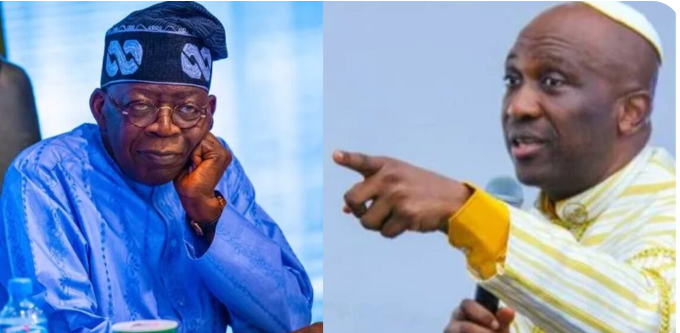
“Your Taxation Advisers Are Digging Your Grave” – Primate Ayodele Fires Fiery Warning at Tinubu Over Proposed Fuel Tax

In what has now sparked a heated debate across political and religious circles, the leader of the INRI Evangelical Spiritual Church, Primate Elijah Ayodele, has issued a stern and unsettling warning to President Bola Ahmed Tinubu concerning his administration’s controversial fiscal plans. The cleric, well known for his fiery prophecies and fearless political commentary, declared during a recent church service that the president’s advisers on taxation are setting him up for political disaster. His remarks came in direct response to the widely speculated proposal of a 5% tax on fuel, a policy that has already stirred fears among Nigerians still grappling with the biting effects of subsidy removal.
Primate Ayodele did not mince words as he looked straight into the camera during his televised ministration and declared, “Your taxation advisers are digging your grave for you.” He went further to explain that the Nigerian masses are already under immense economic pressure and would not accept another burden disguised as fiscal reform. According to him, the proposed 5% fuel tax is not only ill-timed but also doomed to fail, warning that if President Tinubu insists on implementing it, his government would collapse under the weight of public outrage and mismanagement. The cleric, who has a long history of dabbling into political predictions that often dominate headlines, stressed that such taxation policies would bring nothing short of calamity upon the nation, further eroding public trust in an administration that is already facing waves of criticism.
Speaking with unusual urgency, Ayodele advised Tinubu to abandon the policy outright, urging him to instead listen carefully to the counsel of his Minister of Finance who, according to him, should redirect the president away from this dangerous path. “If you go on with this tax, your administration will be gone,” he warned with a voice that echoed through his congregation. His words, laced with prophecy but underscored by political analysis, quickly spread online and became a subject of heated debate on social media platforms, with critics and supporters of both the cleric and the government weighing in.
The reactions have been deeply polarized. For some, Ayodele’s message is yet another attempt by a religious leader to insert himself into national politics using prophetic language to comment on socio-economic issues. One online user, Atobajaye, dismissed the prophecy, arguing that Ayodele would be better off joining a political party rather than using “trending social media topics as so-called prophecies just to stay relevant.” Another critic, MagDon, questioned the setting in which these pronouncements were made, suggesting that the pulpit is not the place for political commentary. “Why not hold a podcast and analyse government activities? Church is a place of worship, not political analysis,” he wrote, pointing out what he felt was an abuse of spiritual gatherings.
Others, however, saw Ayodele’s warning as both timely and necessary. A user identified as PAPEE defended the cleric’s position, pointing out that Tinubu himself had previously admitted that his administration would widen the tax burden, reduce purchasing power, and potentially slow down the economy. “You didn’t hear when he said he will widen the tax burden? His advisers are not even in Nigeria but in France. They don’t understand the reality of what Nigerians are facing,” PAPEE wrote, placing the blame on the president’s economic think tank for being disconnected from the struggles of ordinary citizens.
The subject of taxation has remained one of the most contentious issues in Nigeria’s political space, particularly since President Tinubu’s removal of the fuel subsidy in 2023—a move that sent shockwaves across the country, leading to unprecedented hikes in transportation costs, food prices, and inflation. While the government has consistently defended its reforms as necessary for stabilizing the economy, critics argue that ordinary Nigerians are being pushed to the breaking point. In this context, the news of a potential 5% fuel tax has only heightened public anxiety, with many predicting unrest should the policy be enforced. Ayodele’s prophecy, therefore, resonates with the growing fear that the administration could face serious backlash if it underestimates the limits of public tolerance.
Interestingly, some commentators have turned the spotlight back on the church itself, hinting that religious institutions may be more concerned about their own finances than the plight of the masses. A user named Ilesanmi Awolusi bluntly noted that Nigerian pastors would themselves be among the biggest losers when the taxation structure tightens. “Top 10 richest churches in the world, Nigeria no dey, but Top 10 richest pastors, we get 6 Nigerians there. Unah go pay tax tired from January 2025,” he wrote, implying that Ayodele’s warning might be motivated by fear of the impact on mega churches’ financial empires rather than a genuine concern for the people.
Despite the criticism, the primate’s warning has caught national attention, especially after he added that Tinubu would not win a second term if he continues on this path. His statement, circulated widely with the caption “Tinubu will not win second term – Primate Elijah Ayodele,” was accompanied by a video clip shared by publicist Dami’ Adenuga, further amplifying the controversy. Nigerians, who are already used to the cleric’s politically charged prophecies, are now left debating whether this is another instance of spiritual foresight or simply a loud echo of what many citizens are already thinking about the state of the economy.
The government, for its part, has yet to issue an official response to Ayodele’s remarks. However, insiders suggest that the Tinubu administration is aware of the public sentiment and may tread carefully before rolling out additional taxes on essential commodities. The opposition has also seized on the moment, with some already using the cleric’s words to stoke political narratives ahead of the 2027 elections. Statements from the Peoples Democratic Party (PDP) in recent days have insisted that Tinubu should “prepare his handover note” as Nigerians are “ready to vote him out,” reflecting the growing mood of discontent that Ayodele’s prophecy has now intensified.
For ordinary Nigerians, however, the debate goes beyond politics and prophecy. It cuts to the heart of their daily struggles in a nation where inflation, unemployment, and high living costs continue to suffocate the masses. Whether or not Ayodele’s prophecy comes true, the reality remains that any new tax on fuel will ripple across every sector of the economy, deepening the hardship for millions. In the words of a social media user who captured the sentiments of many, “This is not about prophecy or politics. It is about survival. Nigerians cannot take more suffering.”
As the dust settles around Ayodele’s latest prophecy, the larger question remains whether President Tinubu will heed the warning or press forward with his fiscal reforms. With the weight of public expectation, the burden of governance, and the glare of prophecy all converging, the coming months may prove decisive not only for his administration but also for the future trajectory of Nigeria’s fragile economy.


